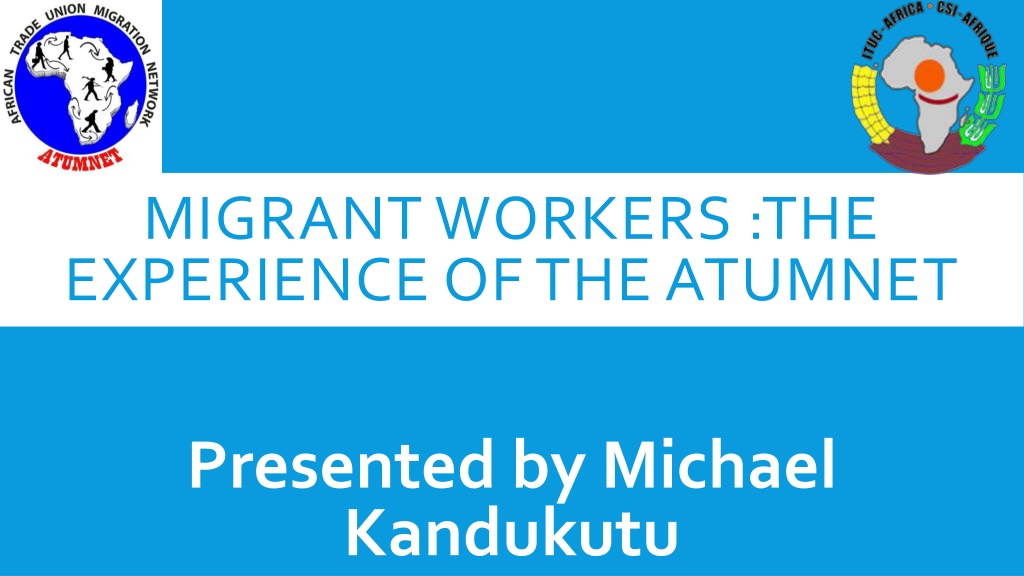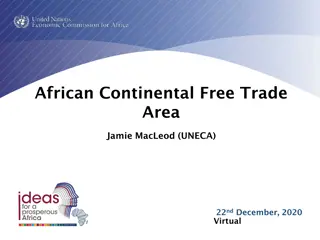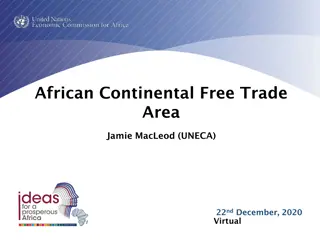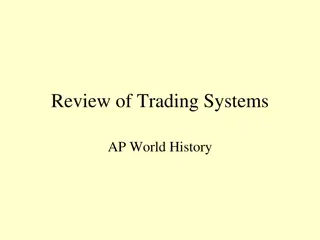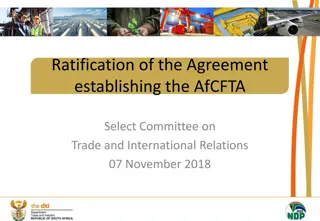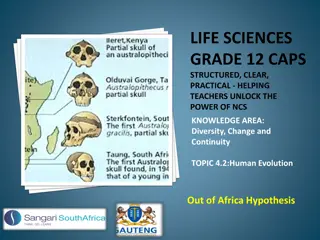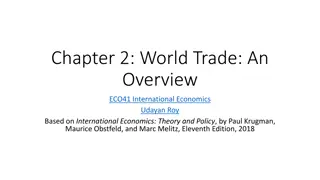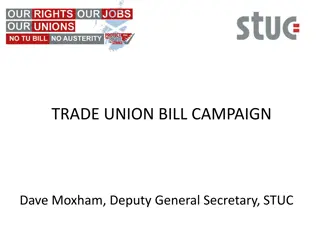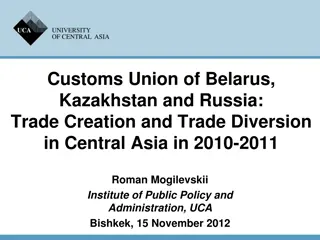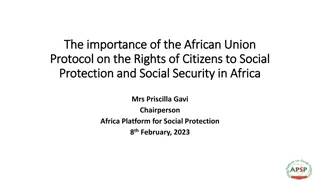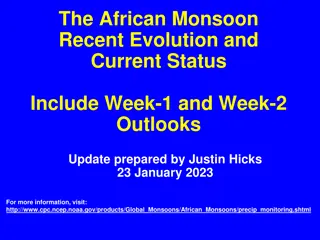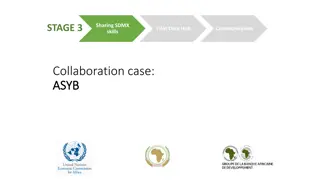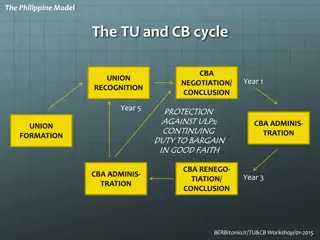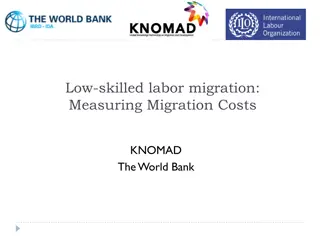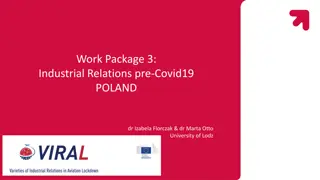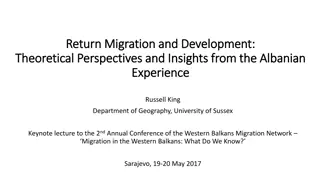African Trade Union Migration Network (ATUMNET): Addressing Migration Governance in Africa
The African Trade Union Migration Network (ATUMNET) focuses on addressing the governance of migration in Africa, emphasizing the importance of trade unions in shaping policies for migrant workers. Formed in 2016, ATUMNET aims to enhance the rights of migrants and refugees while promoting development benefits of migration across the continent. Through collaboration with regional and international institutions, ATUMNET seeks to create a platform for coordinated responses to migration and labor migration issues in Africa.
Download Presentation

Please find below an Image/Link to download the presentation.
The content on the website is provided AS IS for your information and personal use only. It may not be sold, licensed, or shared on other websites without obtaining consent from the author. Download presentation by click this link. If you encounter any issues during the download, it is possible that the publisher has removed the file from their server.
E N D
Presentation Transcript
MIGRANT WORKERS :THE EXPERIENCE OF THE ATUMNET Presented by Michael Kandukutu
AFRICAN TRADE UNIONS AND MIGRATION GOVERNANCE Migration is and will remain a natural human phenomenon. It has countless gains for human and their communities, economies Migration is thus not a crisis, but the governance of it, especially the factors that trigger and exacerbate irregular, spikedandforced migration trendsare the crisesthat must begenuinely andholisticallydealtwith. Migration in its process starts with about 65% labour migration. Aside, refugee situations, migration is largely about economic survival and the quest for a better life. Thus, jobs and decent wages are mostly at the heart of migration and human dignity.Even refugees want towork andnot to depend on hand-outs. Ifmigration isabout jobs,workers andtrade unionshave directrolesto playinthe governance of itthereof. African trade unions got on board the migration governance engagement rather late. The African Trade Union Migration Network a product of two Congresses resolutions of the ITUC-Africa (www.ituc-africa.org) is a response to effectively calibrate and focus an African trade union movement response to driving a rights-based approach to migration.
AFRICAN TRADE UNION MIGRATION NETWORK ATUMNET was formally formed and launched in August, 2016 after a meeting in Kigali, Rwanda, under the auspices of the African Regional Organization of the International Trade Union Confederation (ITUC-AFRICA). ATUMNET is a platform for all national trade union organizations in the 52 African countries where ITUC-Africa currently has affiliates, created to design and deploy African trade union responses to the issues of migration and labour migration, as well as link it to the actualisation, enjoyment, defence, protection and promotion of the rights of migrants and refugees as well as contribute to enhancing the development benefits of migration. Deepen and increase African trade unions engagement on migration and labour migration issues with the view to improve the spaces and opportunities for migrants and members of their families to enjoy their human and workers rights; To be an organised platform that would be able to liaise with and partner the African Union and other regional and international institutions on migration and development issues as they affect migrants from and in Africa.
OBJECTIVES OF THE FORMULATION OF ATUMNET To create a continent-wide platform that will help to bring cohesion, order and efficiency to trade union interventions on migration and labour migration issues To deliver development gains for the economies involved in migration at all the various stages and chains (sending, transit and receiving/host economies. To advocate for sound policies and strong institutions at multiple levels that will address the challenges posed by rising international labour mobility in Africa in order to fulfil its true potential for economic and social gain. To addressing key knowledge gaps around the extent of irregular migration, migrant workers participation in the formal and informal economy, and the extent of labour abuses migrants might face through standard labour migration statistics.
MOST PREVALENT CAUSES OF FORCED MIGRATION WITHIN THE REGION Unemployment and underemployment young people mostly affected. The youth bulge that should be an advantage is fast becoming a curse and these days we hear of women education as a possible response to address the African growing population and hear or talk less about the economic injustice and exploitation that African economies have been and continued to be exposed to. Political instability and political persecution mostly from civil conflicts and other forms of non-war, but lethal violence and the growing nature of liberal democracy in Africa of winners-take-all approach Insecurity and terrorism the activities of extremists groups, especially in the Sahel region is forcing many to move and more youth to embrace desperate journeys as against being recruits for the terrorist groups Economic instability Africa continues to experience jobless growth and wages are stagnant and deplorable Climate and environment change effects and the low mitigation and adaption capacities of African communities drought, desertification, deforestation. The drying up of the Lake Chad is throwing up hardship and exacerbating miseries of fishermen, farmers and auxiliary workers there.
PROPOSED ATUMNETSSTRATEGIES TO DEAL WITH IDENTIFIED CHALLENGES Organising of migrant populations where they exist (inside and outside Africa) to give them voice and representation so as to enhance their protection and reduce exploitation our target is to organise 70,000 migrantsperyear. Pursue ratification and genuine application of relevant migration instruments AU FMP (2018), ILO Conventions governing migration and labour migration (C.97, 143, C81, C189, C181) and sub-regional protocols such as the ECOWASFMMP,dittoUNMigrantsWorkersCovenant(ICRMW)1990 Advocacy campaign on the better integration of Africa Visa openness campaign (as at today, Ethiopia is the latest (very important) African country that has agreed to visa on arrival for persons bearing African passport). A better integrated Africa will improve knowledge/skills/talent/capital/entrepreneurial/ cultural movement, which willaidcohesion,innovation,toleranceandpeace.
CONTD Continuous advocacy on job creation and the payment of decent wages ATUMNET push for the ratification of ILO C.122 (Employment Policy) and the effective functioning of the national and regional social dialogue mechanism to be used to address employment creation opportunities. On wages, we are pushing for the adoption of an African Minimum Wage. We are calling on the AU to declare 2019 as the year of Minimum Wage andDevelopment .Theideaistotake wagesoutofbusiness competitionandstem wagepoverty asaresult. Advocacy for the better governance of Bilateral Labour Migration Agreements, especially with the Gulf Cooperation Council (GCC) States to urgently reform the Kafala sponsorship system. Qatar has made great progressandweappreciateit.SaudiArabia,UAE,OmanandBahrainwillneedtodo more Still on labour migration to the GCC states, we want to see genuine and effective dialogue system and process. The Abu Dhabi Dialogue (ADD) needs to stocktaken and be beyond mere [African] States attendance sprinkling, andyes,non-stateactorsbe accordedaccess.
CONTD We want to see more and better BLMA on skills development and Exchange similar to what Germany and the Philippines have going. African youths can benefit from employment and wealth creation skills and capacities. This helps to make migration achoice. An expanded skills-focused Erasmus programme can help expose youngpersons from different societies todifferent realities. Our advocacy on taming xenophobia and desperate journeys through education of workers and families is, though small scale, is working. We want to do more by creating an African trade union migration programme on Radio to give grassroot awareness, information and education to the general populace.We need financial supporttomake this happen. Advocacy on governance and accountability in Africa taming public (asset looting) and private (Illicit Financial Flows) sector corruption so as to increase the spaces for resource mobilisation to finance social protection (effective andaffordable public services delivery) Research anddatacollection figures help for better planning andintervention targeting.
TOWARDS COMPREHENSIVE LABOUR MIGRATION POLICY Draft National Migration Management and Development Policy Draft National Migration Management and Development Strategy: migration policy, legal & institutional framework, skills retention & development, labour migration, diaspora participation, economic and community development safe migration, cross-border management Focus on brain drain, remittances, labour migration, cross-border management, human trafficking and smuggling, migration and gender, migration and health
TOWARDS COMPREHENSIVE LABOUR MIGRATION POLICY To strengthen governance of labour migration, align with international norms; To promote decent working conditions for migrant workers, fundamental human and labour rights of migrants and their families; Education and awareness programmes for migrants Enhance mechanisms for harnessing remittances for investment and development; Strengthen and engender the Labour Migration Information System ; Strengthen dialogue on labour migration at national level; Strengthen effective participation in regional and international dialogue on labour migration; To strengthen Migration Resource Centres (MRCs) that will provide educative, informational material and awareness programmes Harmonize existing efforts and initiatives that have been undertaken to harness the positive benefits from labour migration.
RECOMMENDATIONS Strengthen labour and union capacities Sustainable funding Lobby for ratification and implementation of Convention No. 189 Lobbying for adoption of national migration policies Lobbying for a clear agenda to support migrant workers Education about options for safe migration, expectations, context in destination countries Partnerships with unions in destination countries Strategic partnerships with other stakeholders, foreign affairs Ministries, IOM, ILO,EU,ACP
CONCLUSION Migrant workers at risk: gender, class, migrant status Therefore need to strengthen legislative, policy and institutional frameworks in these areas Gender: strengthen implementation, change patriarchal mindsets and attitudes Migration: ratify and implement migration conventions, adopt progressive migration policies and amend legislation
